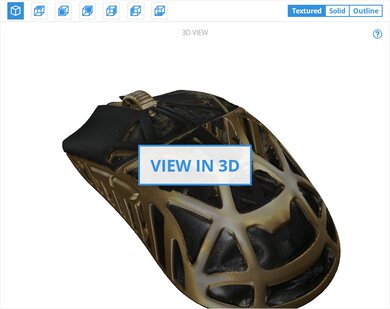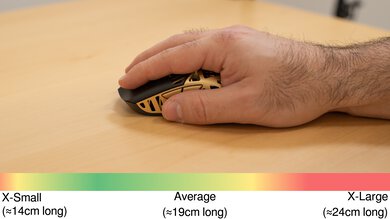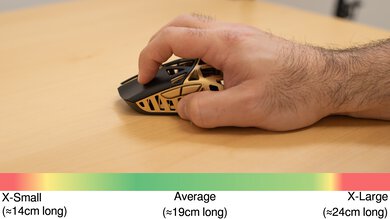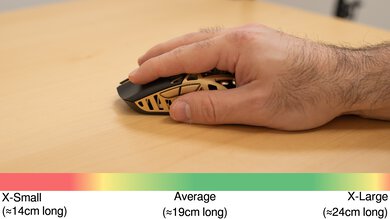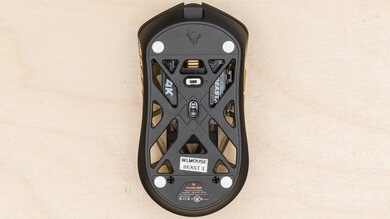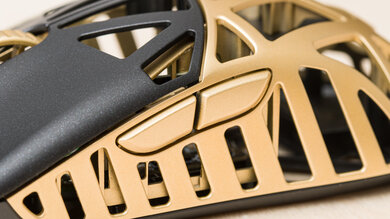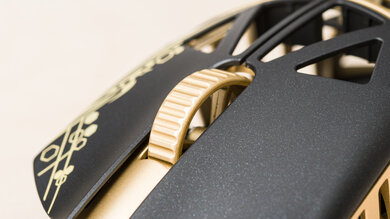The WLmouse Beast X is an ultra-lightweight wireless gaming mouse. It has a magnesium alloy exoskeleton body with a symmetrical shape and uses PixArt's flagship 3395 sensor, supporting a 4000Hz maximum polling rate. It also comes with alternate PTFE and glass mouse feet options, and its included cube-shaped wireless receiver has added RGB lighting and an LCD screen that displays the time, the mouse's battery life, and your chosen CPI and polling rate settings.
There's a smaller variant of this mouse called the WLmouse Beast X Mini. For more details, see the Differences Between Variants section below.
Our Verdict
The WLmouse Beast X is decent for work but isn't designed specifically for this usage. It feels sturdy and exceptionally lightweight but lacks Bluetooth connectivity and multi-device pairing. Its scroll wheel also lacks useful productivity features like tilt inputs and free-scrolling.
-
Excellent build quality.
-
No Bluetooth connectivity.
-
Scroll wheel lacks productivity features like tilt inputs and free-scrolling.
The WLmouse Beast X is a fantastic FPS gaming mouse. Its magnesium alloy body makes it exceptionally lightweight and easy to move quickly and accurately. Performance-wise, it has remarkably low and consistent click latency and outstanding sensor latency and accuracy, providing all-around performance that's more than suitable for gaming at any competitive level. Unfortunately, its scroll wheel is a minor weak spot as it's made of plastic and feels a bit cheap compared to the rest of the construction. It also takes very little force to actuate the middle mouse button, which some people may appreciate, but it may result in accidental inputs if you're used to heavier scroll wheel buttons.
-
Excellent build quality.
-
Exceptionally lightweight.
-
Remarkably low and consistent click latency.
-
Outstanding all-around sensor performance.
-
Supports a maximum wireless polling rate of 4000Hz.
-
Scroll wheel doesn't feel as high quality as the rest of the construction, and the scroll click's lightweight actuation may result in unintentional inputs for some.
While it isn't designed specifically for this usage, the WLmouse Beast X is very good for MMO gaming overall. However, it doesn't have nearly as many side buttons as dedicated MMO gaming mice. Additionally, its scroll wheel is made of plastic and feels cheaper than the rest of the mouse. The scroll click also takes only minimal force to actuate, which some people may appreciate but may result in accidental inputs if you're used to heavier middle mouse click buttons. That being said, it has excellent overall build quality, and its lightweight magnesium alloy body feels very sturdy. It also provides remarkably low and consistent click latency and outstanding sensor performance.
-
Excellent build quality.
-
Remarkably low and consistent click latency.
-
Outstanding all-around sensor performance.
-
Doesn't have nearly as many programmable side buttons as a dedicated MMO gaming mouse.
-
Scroll wheel doesn't feel as high quality as the rest of the construction, and the scroll click's lightweight actuation may result in unintentional inputs for some.
The WLmouse Beast X offers exceptional raw performance, making it more than suitable for playing games in any genre at any competitive level. Its click latency is remarkably low, and its sensor supports a maximum wireless polling rate of 4000Hz and provides superb motion and accuracy performance that closely translates the physical movements you make with your mouse into the cursor movements you see on screen.
-
Remarkably low and consistent click latency.
-
Outstanding all-around sensor performance.
-
Supports a maximum wireless polling rate of 4000Hz.
- 7.0 Work
- 9.5 Video Games (FPS)
- 7.8 Video Games (MMO)
- 9.6 Raw Performance
Changelog
-
Updated Oct 08, 2024:
We've added a link to the newly reviewed WLmouse Beast X Max in the Hand Size Recommendation section of this review.
- Updated Oct 07, 2024: We've updated the name of this mouse from the WLmouse BEAST X to the WLmouse Beast X to be more consistent with other WLmouse models.
- Updated May 21, 2024: We've added a link to the newly-reviewed Razer Viper V3 Pro in the Style section of this review.
-
Updated Mar 07, 2024:
We've updated the text in the Style box to reflect the differences in the design between different variants.
- Updated Feb 22, 2024: Review published.
Check Price
Differences Between Sizes And Variants
The WLmouse Beast X is available in several different colorways. We bought and tested the Black and Gold color option, and you can see the label for our unit here.
There's a smaller size variant of this mouse called the WLmouse Beast X Mini, which we expect to have similar performance. We've provided a chart below with the differences between the variants.
| Name | Size | Color Options | Advertised Weight | Advertised Dimensions |
| WLmouse Beast X | Medium | Black, Red, Purple, Silver, Gold and Black, Pink and Blue, Zebra | 39g - 42g | 122mm Length x 62mm Width x 37mm Height |
| WLmouse Beast X Mini | Small | Stellar Black (glossy), Orange, White, Lilac, Silver, Pink, Violet, Iceblue, Mint Green | 34g ±1g | 116mm Length x 58mm Width x 35mm Height |
Compared To Other Mice
The WLmouse Beast X is a wireless gaming mouse with a magnesium alloy exoskeleton, making it extremely lightweight but sturdy. It bears close similarities with several other recently released gaming mice, notably the Finalmouse UltralightX (Medium/Lion) and the Razer Viper Mini Signature Edition, which are both nearly identical in size and shape.
Compared to these other mice, the WLmouse is considerably less expensive, and at the time of writing, it has been continuously in stock since its launch. At the same time, both the Finalmouse and Razer are being released in small periodic batches at irregular intervals. That said, the combined raw gaming performance of the WLmouse falls just short of the Finalmouse and Razer. It also doesn't match the same premium build quality level as the Razer. Still, it presents a comparatively more accessible and widely available option if you're interested in this current generation of cutting-edge and ultra-lightweight wireless gaming mice.
For more recommendations, see our picks for the best lightweight mouse, the best FPS mouse, and the best wireless gaming mouse.
The Logitech G PRO X SUPERLIGHT 2 and the WLmouse Beast X are wireless gaming mice with symmetrical shapes and comparable raw gaming performance. The WLmouse has a more unusual magnesium alloy exoskeleton, making it significantly lighter. Comparatively, the Logitech has a much more conventional solid plastic body and a more subdued look.
The WLmouse Beast X and the WLmouse Beast X Max are lightweight wireless gaming mice from the same model lineup. The two have the same shape and magnesium alloy construction, but the Beast X Max is bigger. It also uses a newer sensor with better latency and a higher 8000Hz polling rate.
The Razer Viper Mini Signature Edition and the WLmouse Beast X are both wireless gaming mice that have exoskeleton body designs made of magnesium alloy, making them both extremely lightweight and sturdy. The Razer has slightly better overall raw gaming performance, and its build quality feels somewhat better and more premium overall. Comparatively, the WLmouse is available in a range of colors, while the Razer is not. Additionally, the WLmouse has been continuously in stock at the time of writing, while the Razer is only being released in small, periodic batches.
The Finalmouse UltralightX (Medium/Lion size variant) and the WLmouse Beast X are both ultra-lightweight wireless gaming mice with virtually the same symmetrical shape. The Finalmouse is made of carbon fiber composite and has slightly better overall raw gaming performance. Unfortunately, we reviewed an early batch model with build quality issues. Reports from the community suggest that many of these issues have been addressed in later batches. We expect current models to be roughly comparable to the WLmouse regarding build quality. Comparatively, the WLmouse has a magnesium alloy body and is slightly more lightweight. Additionally, the WLmouse is more readily available as it has been continuously in stock at the time of writing, while the Finalmouse has only been released in small staggered batches.
The Finalmouse ULX Pro Series and the WLmouse Beast X are ultra-lightweight wireless gaming mice with nearly identical symmetrical shapes. The Finalmouse is made of a carbon fiber composite and has slightly better raw performance. The WLmouse has a magnesium alloy body and has better overall build quality with fewer squeaks and less flexing. Additionally, the WLmouse is more readily available as it's in continuous production, whereas the Finalmouse was a limited run, and all units were sold at the time of writing.
The WLmouse Beast X and the Pwnage Trinity CF are lightweight wireless gaming mice that are made of exotic materials. The Pwnage is made of a carbon fiber composite, while the WLmouse is made of a magnesium alloy. While both mice use weight-saving cutouts to achieve their incredibly light weights, the WLmouse's cutouts are much larger, making it less comfortable to use than the Pwnage. Still, both mice include adhesive grip tape in the box that can help mitigate potential discomfort. The two mice deliver similarly outstanding raw performance.
The Razer Viper V2 Pro and the WLmouse Beast X are wireless gaming mice with low-profile, symmetrical shapes and comparable raw gaming performance. The WLmouse has a more unusual magnesium alloy exoskeleton construction that helps make it significantly lighter. On the other hand, the Razer has a more conventional solid plastic body design.
The Pwnage StormBreaker and the WLmouse Beast X are wireless gaming mice with magnesium alloy body designs, making them extremely lightweight but very sturdy. Both mice have comparable raw gaming performance and support maximum wireless polling rates of 4000Hz, but the Pwnage has a larger, right-handed shape and allows you to adjust the sensor position with a slider on the bottom of the mouse. The WLmouse, on the other hand, has a smaller symmetrical shape and is lighter.
Test Results
This mouse has a magnesium alloy body with an exoskeleton-like framework with large gaps in the shell that expose its internal components.
There are no visible logos. While there's no RGB lighting on the mouse itself, there is programmable RGB lighting on the included wireless receiver.
Not all variants have the same design as our unit. Some are monochrome with a glossy or matte finish, while others boast a gradient or a unique pattern design. Check out the Differences Between Variants section for more information.
If you're looking for a mouse that performs similarly well but has a more conventional solid plastic shell, check out the Razer Viper V3 Pro.
Note that due to the limitations of the 3D scanning tool, the scan includes imperfections in its portrayal of textures and doesn't accurately depict the open space inside this mouse's exoskeleton. That said, the dimensions and shape of the mouse are correct.
This mouse isn't designed specifically with portability in mind. While it's quite small, it's still somewhat bulky. Additionally, it doesn't have a compartment for storing its receiver, which itself is unusually large and bulky. You can see an image of the receiver here. Additionally, the open exoskeleton design of this mouse means the internals are more open to collecting dust and debris in transit.
The WLmouse Beast X has excellent overall build quality. Its magnesium alloy shell is extremely lightweight but feels very sturdy.
There's a small degree of flexibility in the side panels if you apply considerable force to them. Still, we don't expect this to present any issues unless you hold your mouse extremely tightly. The mouse's underside is made of plastic and flexes with pressure, but this is typical and doesn't present any issues when using the mouse normally.
The cutout segments on either side of the body mouse have rounded edges that don't feel sharp when positioning your fingers over them. The cutouts on the palm rest area have noticeably rougher edges, but these edges typically aren't felt when resting your palm on these sections while using the mouse normally.
There's only minimal side-to-side travel on the left- and right-click buttons, and the scroll wheel is centered and doesn't wobble. Unfortunately, the scroll wheel has a slightly cheaper feel than the rest of the mouse and is made of plastic with a rubber coating rather than magnesium alloy.
During testing, we also noted a minor metallic pinging sound emanating from the left mouse button housing if you lightly lift and drop the mouse. We consider this to be a very minor issue, but it may be irritating to you if you frequently lift and reposition your mouse and you're particularly sensitive to small noises.
This mouse is quite small and has a fairly low-profile, symmetrical shape. It's best suited for small or medium-sized hands for palm, claw, and fingertip grips. If you have larger hands, you'll need to use a claw or a fingertip grip with minimal or no palm contact.
Due to the cutouts on the sides and palm section, some people may find this mouse uncomfortable, especially if you're particularly sensitive to somewhat irregular textures against your palm.
That said, there's a set of adhesive grips included in the box that can help alleviate any discomfort of resting your hand and fingers on the body cutouts and can provide added grip for holding the mouse if you have sweatier hands.
The WLmouse Beast X Max has the same shape but is bigger, so it's more suitable for larger hands.
WLmouse advertises that this mouse has a 300mAh polymer lithium battery, but they don't list an expected battery life on their product page. We've seen reports in the community suggesting a battery life of around 10–15 hours using a 4000Hz polling rate and closer to 30–40 hours using a 1000Hz polling rate.
If you have this mouse and would like to share your battery life experience, we'd love to hear from you in the comments.
This mouse includes an unusual cube-shaped wireless receiver with programmable RGB lighting and an LCD screen that displays the time, current CPI setting, polling rate, and battery life. You can see an image of the receiver here.
This mouse comes with a paracord-like charging cable. This cable isn't very flexible compared to most other paracord-like cables. While the material doesn't drag directly on desks, it retains noticeable kinks from its packaging and may be stiff enough to catch on nearby objects on your desk.
This mouse has exceptional feet that glide very smoothly with low friction on hard or soft mousepads. They make only minimal scratching sounds when used directly on desks.
This mouse came with four PTFE dot-style feet pre-installed on the mouse, which is what we've based our test results on. Two alternate sets of feet are included in the box: a larger-style PTFE set and a larger-style glass set. You can see an image of these alternate feet here.
We expect the alternate larger PTFE set to perform roughly the same as the PTFE dots that come pre-installed. We expect the glass feet will be noticeably faster and smoother feeling.
Note that some users online have reported receiving different configurations of extra feet. In some cases, some have noted that their mouse came with no feet pre-installed. On The WLmouse website, the product page for the WLmouse Beast X lists only one set of additional PTFE feet. If you have this mouse and would like to share your experience, we encourage you to reach out in the Comments section.
Using this mouse's software, you can reprogram the right click, scroll click, and both side buttons. However, you can't reprogram the left-click button or the up/down scroll inputs.
The WLmouse Beast X has exceptionally low and consistent click latency performance. It provides an exceptionally responsive feeling experience for gaming in any genre and is well-suited for both casual and competitive play. This test was conducted at the maximum wireless polling rate of 4000Hz and with Slam Click Protection disabled in the software.
For comparison, we conducted additional testing at 4000Hz and with Slam Click Protection enabled and found identical results.
We also conducted testing at the 1000Hz polling rate with Slam Click Protection disabled. As expected, this results in marginally higher latency measured at 1.5 ms.
The WLmouse Beast X provides superb CPI performance with a sensor that accurately and consistently tracks your movements.
This mouse offers outstanding sensor latency performance. The sensor reacts extremely quickly when you move your mouse, and these movements closely match the timing of the cursor movements you see on screen. We tested this mouse at the maximum wireless polling rate of 4000Hz and with Motion Sync disabled.
For comparison, we conducted additional tests using a 4000Hz polling rate and with Motion Sync enabled with the following results:
- Delay To Start Of Movement: 11.9ms
- Delay At Half Movement: 3.3 ms
- Delay To End Of Movement: 5.5 ms
You can see a graph of these supplementary results here.
We also tested this mouse using a 1000Hz polling rate with Motion Sync disabled with the following results:
- Delay To Start Of Movement: 16.7ms
- Delay At Half Movement: 4.3 ms
- Delay To End Of Movement: 6.5 ms
You can see a graph of these supplementary results here.
The available wireless polling rate settings are 125Hz, 250Hz, 500Hz, 1000Hz, 2000hz, and 4000Hz. When using this mouse wired, the polling rate settings are 125Hz, 250Hz, 500hz, and 1000Hz.
You can adjust various sensor settings in the software, including CPI, Motion Sync, and lift-off distance. For more details, see the Configuration Software section.
Scrolling takes a moderate amount of force, but it's fairly quiet and feels precise. However, the scroll click is lightweight and may result in accidental clicks if you're used to mice with heavier middle-click buttons, especially when scrolling quickly or forcefully.
The scroll wheel doesn't have the same material feel as the rest of the body and is likely made of plastic with a rubber coating, not magnesium alloy. Overall, the scroll wheel feels lower quality compared to the construction of the rest of the mouse.
The left and right-click buttons are relatively quiet and unlikely to bother those around you. The scroll wheel, scroll click, and side buttons are also on the quieter side, especially compared to some of the other mice available at the time of writing with magnesium alloy body designs.
The software is straightforward and includes expected settings to adjust the polling rate, CPI, and lift-off distance. You can adjust the sleep settings, debounce time, and enable or disable motion sync. Additionally, you can create macros, save your custom profile settings to onboard memory, and customize the wireless receiver's RGB lighting color, effect, and brightness.
Comments
WLmouse Beast X: Main Discussion
Let us know why you want us to review the product here, or encourage others to vote for this product.
- 32120
I thought this site was good until I read this the “Compared to Others” section of this review, then I realised that the authors are full of the same anti china brainworms that others are. I own this mouse. I also own the Razer that this review claims is “higher build quality”. DO NOT BUY RAZER. They have some of the shoddiest build quality on the market, the crappiest buttons, the crappiest plastics, and they break CONSTANTLY. They’re just not good. This reviewer claiming that the Razer has better build quality than the WLMouse is particularly wild as the WLMouse I’ve now been using for 1 year every single day is going strong with zero flaws showing. Only need to replace the skates but that’s normal for every mouse. Highly recommend. It’s incredibly good.
Hey there awoofle!
Thank you for sharing your opinion!
We still scored the WLMouse Beast X 8.5/10 for build quality, which is excellent in our books. Our copy had a few more rough edges and (very) minor issues like metallic pinging noises and a cheaper-feeling scroll wheel than the Razer Viper Mini Signature edition, though, which is why the Razer scored a 9.0/10 for build quality. It’s possible that you got a better copy than we did! That said, the differences we noticed are still incredibly minor.
I’m really sorry that you disagree with our score, but I’m also glad you’re enjoying your WLMouse!
- 10-11-1
I thought this site was good until I read this the “Compared to Others” section of this review, then I realised that the authors are full of the same anti china brainworms that others are.
I own this mouse. I also own the Razer that this review claims is “higher build quality”. DO NOT BUY RAZER. They have some of the shoddiest build quality on the market, the crappiest buttons, the crappiest plastics, and they break CONSTANTLY.
They’re just not good.
This reviewer claiming that the Razer has better build quality than the WLMouse is particularly wild as the WLMouse I’ve now been using for 1 year every single day is going strong with zero flaws showing. Only need to replace the skates but that’s normal for every mouse.
Highly recommend. It’s incredibly good.
- 10-11-1
the angry miao infinity mouse seems to be possible competition for this line at a similar price point, any plans on reviewing that? its also angry miao’s first mouse, so could be interesting (for good or for worse)
hotswap magnetic battery, wireless desk dongle is the charger for them, hollow metal frame, and 8k polling on both wired and wireless
Edited 2 months ago: punctuation/typos Update: We’ve added a link to the newly reviewed WLmouse Beast X Max in the Hand Size Recommendation section of this review.



